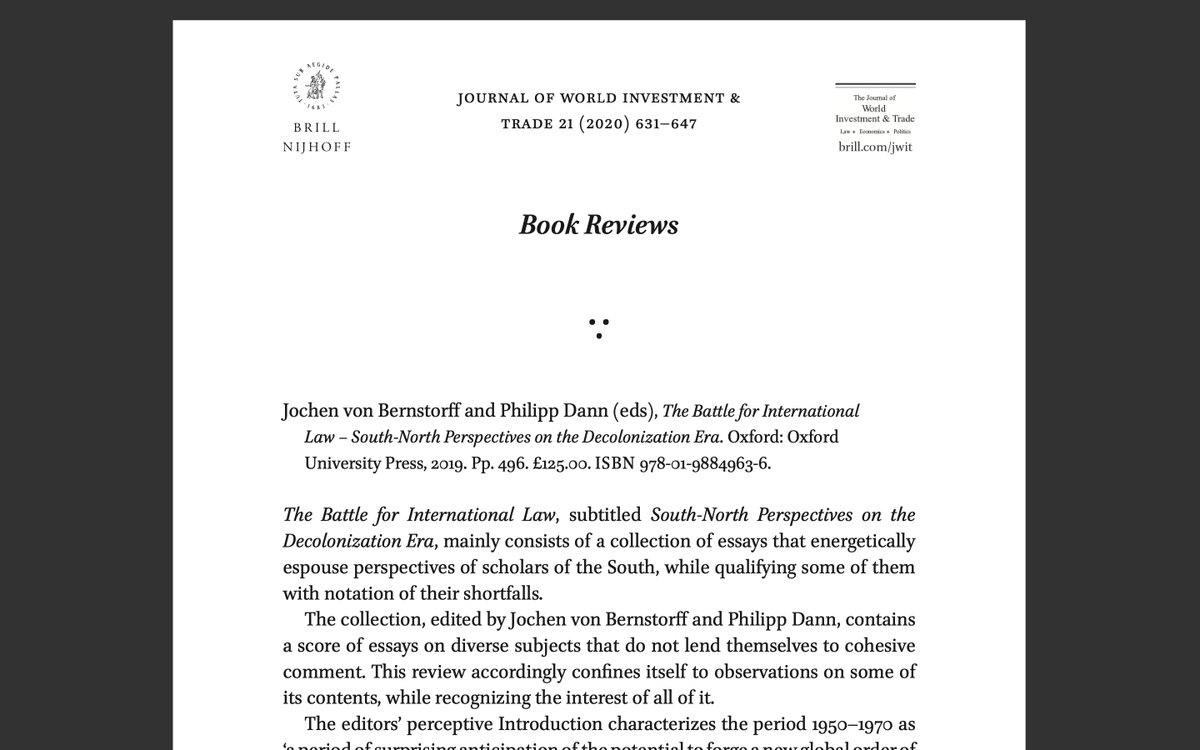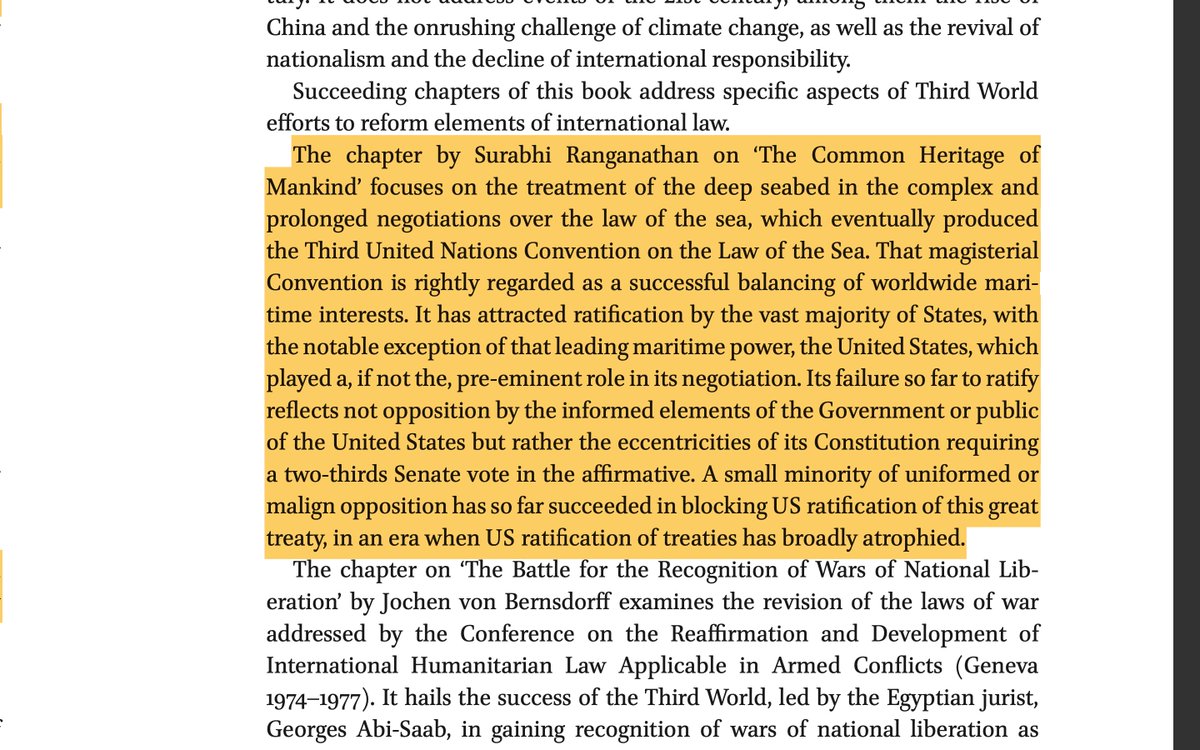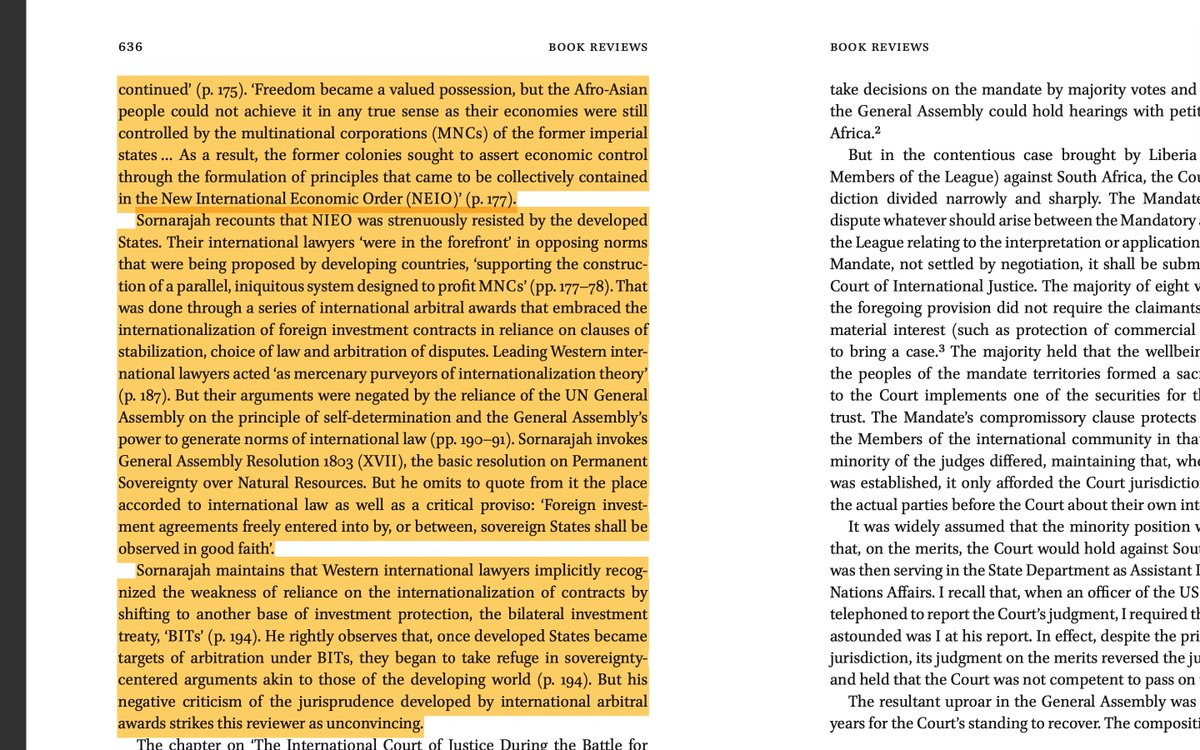THREAD on #StephenSchwebel, #JWIT & racism in international economic law:
I remember the first time I had to tell my grandfather something he said was racist. I started with "Grandpa, you can't say that" and hoped that would be enough.
It was not.
1/
I remember the first time I had to tell my grandfather something he said was racist. I started with "Grandpa, you can't say that" and hoped that would be enough.
It was not.
1/
When something is implicitly (rather than overtly) racist, you have to explain the impact of assertions. Because we recognize racism as a character flaw, doing this with someone you once admired can be painful for both sides. Consequently, I normally do this in person.
2/
2/
But I don't know #StephenSchwebel personally, he's the former President of the ICJ, & he just published a book review in JWIT that is embedded with racism.
This conversation needs to be public.
So, I'll start it, even while I worry that I can't quite do it justice here.
3/
This conversation needs to be public.
So, I'll start it, even while I worry that I can't quite do it justice here.
3/
In the highlighted parts, Schwebel creates an angel/demon, virgin/whore dichotomy between 'middle classes of the industrialized democracies' & 'Third World governments which too often are incompetent or corrupt.'
4/
4/
This is the same framing we see in Brexit & MAGA, which Schwebel seems to decry in the next few lines even while he plays the working & middle classes of the 'Global North' against the 'incompetent or corrupt' governments in Africa, Asia, & Latin America.
5/
5/
Middle classes of industrialized democracies are not being unduly taxed because of 'international welfarism.' They are being taxed so that the global elite don't have to be.
From the US @TaxPolicyCenter, we see how the burden of taxation has shifted over time.
6/
From the US @TaxPolicyCenter, we see how the burden of taxation has shifted over time.
6/
But that's the greatest defense IIL has: it is necessary so as to control the 'strongmen' of the abusive Third World who take advantage of the hard work of the industrialized states. IIL is the only resort for those hardworking members (whispers: of the global elite).
7/
7/
The angel/demon, virgin/whore framing is furthered by the other highlighted parts:
- OPEC has 'cartel-like price fixing' &
- Third World populations suffer 'from exploitation *not* by former colonial rulers but by that of home-grown autocrats' (emphasis added).
8/
- OPEC has 'cartel-like price fixing' &
- Third World populations suffer 'from exploitation *not* by former colonial rulers but by that of home-grown autocrats' (emphasis added).
8/
Middle classes in industrialized states are not expected to pay for the historical injustice perpetrated by their gov'ts on the Third World, but if OPEC gov'ts work collaboratively to ensure the greatest value for their natural resources/ citizens, it's criminal.
9/
9/
For Schwebel, the angels/virgins of the West are being criminally exploited by the demon/whores of OPEC: Iran; Iraq; Kuwait; Saudi Arabia; Venezuela; Qatar; Indonesia; Libya; UAE; Algeria; Nigeria; Ecuador; Gaban (& now Angola, Equatorial Guinea & Congo).
https://www.opec.org/opec_web/en/about_us/25.htm
https://www.opec.org/opec_web/en/about_us/25.htm
These gov'ts are clearly not angels (no gov't is) but OPEC working together to ensure the greatest value for their citizens would be praised as good stewardship if only their demands did not come at the expense of the virgins of industrialized states.
11/
11/
Industrialized states are not criticized for protecting their nationals, only for nationalistic rhetoric. As such, Schwebel portrays int'l aid as 'unconstrained generosity' not an international responsibility. The West is stingy but not criminal when it protects its wealth.
12/
12/
Schwebel wants us to believe that the exploitation of those in the Third World comes exclusively from leaders of the Third World (hence the above emphasis on 'not')
The US has 614 billionaires, China 389. The entirety of Africa 11. At best, Schwebel's critique is simplistic.
13
The US has 614 billionaires, China 389. The entirety of Africa 11. At best, Schwebel's critique is simplistic.
13
At worst, it indicates a willingness to excuse certain types of exploitation, namely those deemed acceptable in & by industrialized states. Jeff Bezos's exploitation is fine & not the "real" cause of workers' suffering.
14/
14/
Such arguments are particularly troubling when they come from someone so embedded in institutions --IIL & ISDS-- that have privileged western investors at the expense of Third World citizens. IIL claims that investment treaties are indicators of good governance but
15/
15/
as Mavluda Sattorova's insightful book demonstrates, investment treaties are not necessarily instruments of good governance & too often privilege foreigners over local needs & interests.
16/ https://www.bloomsburyprofessional.com/uk/the-impact-of-investment-treaty-law-on-host-states-9781849465854/
16/ https://www.bloomsburyprofessional.com/uk/the-impact-of-investment-treaty-law-on-host-states-9781849465854/
In criticising but not engaging with serious concerns on the impacts of IEL raised by the Third World & the NIEO resolution, Schwebel perpetuates the narrative that the Third World remains poor as a result of inherent deficiencies w/o addressing the role global structures,
including IIL & ISDS, play in perpetuating bad governance. While I recognize the legitimacy (not validity) of arguments justifying IIL, Schwebel's apologia rests on tropes of the Third World, not on engagement with the critiques.
18/
18/
I will inevitably be criticized for picking apart only a few of Schwebel's sentences, but this is because he otherwise says very little substantively. This raises a final racialized problem with the review: Schwebel does not engage with the book's Third World authors.
19/
19/
With Surabhi Raganathan's chpt, I learn nothing of what she argues. He explains US Con Law, but it's unclear if he's reiterating or responding to something she said, or simply wants us to understand the US's position, b/c he doesn't actually engage with her.
20/
20/
The only thing Schwebel says of @l_eslava's chapter is: "The chapter on the developmental State by Luis Eslava evokes the history of Latin America. ... He concludes that:" The rest are quotes from Eslava.
21/
21/
While Sornarajah is given greater space, the totality of the engagement comes in critiquing Sornarajah for not including a 'critical proviso' and simply dismissing his engagement with IIL jurisprudence as 'unconvincing.'
22/
22/
Admittedly, Schwebel does not do much better with Western scholars, but at least he praises Matthew Craven for being 'astute' and offering a 'penetrating, if terse' chapter 'of particular interest.'
23/
23/
He uses Ingo Venzke's chapter to tell a personal anecdote about the surprise of the ICJ's Southwest Africa cases.
But in total, this means we know that Craven's chapter is insightful, Sornarajah's unconvincing, & everyone else wrote stuff.
24/
But in total, this means we know that Craven's chapter is insightful, Sornarajah's unconvincing, & everyone else wrote stuff.
24/
It is dubious to so casually dismiss criticisms & scholars from the Third World. It suggests they are not worth engaging. But, it was not the chpt authors that were unworthy. The content of Schwebel's review perpetuates racist tropes & narratives. JWIT readers deserved better.
//
//

 Read on Twitter
Read on Twitter














